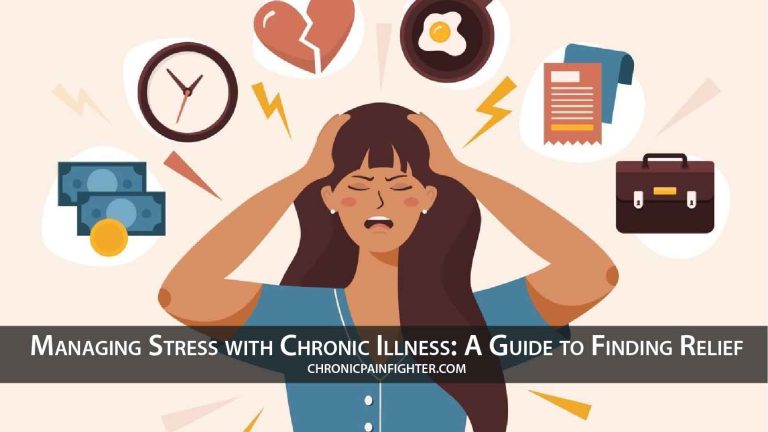Chronic illness can be a rollercoaster of emotions, physical limitations, and a constant battle against discomfort. The stress it brings is a real challenge, impacting your mental well-being and making your symptoms feel even worse. But you’re not alone. Many people with chronic illness navigate the emotional turmoil and learn to manage stress effectively. This guide provides strategies and resources to empower you to take control and find relief.
Understanding the Stress Connection
Stress isn’t just about deadlines or arguments. Chronic illness brings its own unique stressors:
- Physical Pain and Discomfort: Living with chronic pain can be relentless, affecting your mood, sleep, and ability to participate in activities you enjoy.
- Treatment Uncertainty: Navigating healthcare systems, trying different medications, and dealing with unexpected side effects can be frustrating and stressful.
- Loss of Control: Feeling limited by your condition can trigger feelings of helplessness, anger, and resentment.
- Social Stigma: Others may not understand your condition, leading to misunderstandings, judgment, and isolation.
- Financial Strain: Medical costs, lost wages, and the need for special equipment can create significant financial burdens.
Stress Management Strategies: Tools for Your Toolbox
Managing stress with chronic illness is an ongoing process, not a quick fix. The goal is to find a combination of strategies that works best for you. Here are some proven methods:
1. Mindfulness and Meditation:
- Focus on the Present: Mindfulness brings your attention to the present moment, helping to reduce worry about the past or future.
- Stress Reduction: Meditation has been shown to reduce stress hormones, improve mood, and enhance emotional regulation.
- Guided Meditations: Apps and websites offer guided meditations specifically tailored to chronic illness management.
- Mindfulness Breathing: Simple breathing exercises can calm your nervous system and reduce anxiety in the moment.
2. Physical Activity:
- Move Your Body: Even gentle movement, like walking or swimming, can release endorphins, reduce stress hormones, and improve sleep quality.
- Low-Impact Options: Choose activities that work for your physical limitations, avoiding anything that aggravates your condition.
- Strength Training: Building muscle can improve your physical capacity and increase your tolerance for everyday activities.
- Consult a Professional: Talk to your doctor before starting any new exercise program, especially if you have specific limitations.
3. Relaxation Techniques:
- Deep Breathing: Slow, deep breaths send calming signals to your body, promoting relaxation and reducing anxiety.
- Progressive Muscle Relaxation: Tensing and releasing different muscle groups can relieve tension and promote a sense of calm.
- Visualization: Imagine yourself in a peaceful setting, using your senses to create a calming experience.
- Warm Baths: The warmth and buoyancy of a bath can soothe muscles, ease pain, and promote relaxation.
4. Healthy Lifestyle Choices:
- Balanced Diet: Eating a nutritious diet provides the energy and nutrients your body needs to cope with stress.
- Adequate Sleep: Prioritize getting enough sleep, as sleep deprivation can worsen stress levels and exacerbate chronic pain.
- Hydration: Dehydration can increase fatigue and anxiety, so stay hydrated throughout the day.
- Limit Caffeine and Alcohol: While these substances may provide a temporary boost, they can disrupt sleep and worsen stress in the long run.
5. Social Connection:
- Support System: Reach out to friends, family, or support groups for emotional validation and practical help.
- Online Communities: Connect with others who understand your condition through online forums or social media groups.
- Therapy or Counseling: A therapist can provide a safe space to explore your emotions and develop coping mechanisms.
- Mindful Communication: Learn to communicate your needs and limitations effectively to those around you.
6. Setting Realistic Expectations:
- Accept Your Limitations: Recognize that your condition may require adjustments and changes to your lifestyle.
- Celebrate Small Victories: Focus on the things you can control, and celebrate even small achievements.
- Seek Professional Help: Don’t hesitate to reach out to your doctor or therapist if you’re struggling to manage stress.
- Practice Self-Compassion: Treat yourself with the same kindness and understanding you would offer a loved one.
Additional Resources:
- The American Chronic Pain Association (ACPA): Provides information, support, and resources for people with chronic pain and their families.
- The National Fibromyalgia Association (NFA): Offers resources and support specifically for individuals with fibromyalgia.
- The Chronic Pain Guide: A website with articles, videos, and tools for managing chronic pain and related stress.
Remember: You are Not Alone
Living with chronic illness is a unique journey. It’s important to be kind to yourself, seek support, and learn to manage stress in ways that work for you. By taking an active role in your well-being, you can find relief, manage your symptoms, and live a more fulfilling life.






